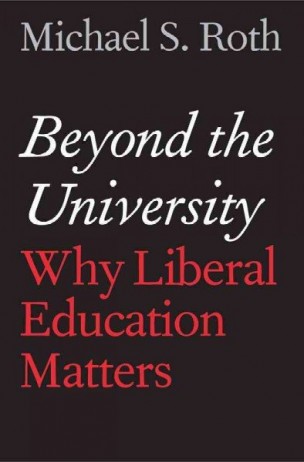
Michael Roth, President of the University and author of “Beyond the University: Why Liberal Education Matters,” gave a lecture entitled “How to Destroy Higher Education” on Tuesday, Feb. 3.
Roth began by describing his own academic career at the University. As a University Major in “History of Psychological Theory,” he classified his undergraduate education as broad and experimental. He acknowledged that critics question this active engagement in a form of learning that has seemingly no instrumental purpose.
Pointing out that many of the people in support of anti-intellectualism attended top universities themselves, Roth took issue with the mentality that some people will fit into the “machine” that is society, while others will have the privilege of running it.
“This, I think, is an assault on equality…by denying education as a vehicle for social change and economic mobility,” Roth said. “It’s a fancy argument made by fancy people, but I think it’s a crude attempt to ensure that hierarchies stay stable and that if there is education that is broad and conceptual…the people [receiving it]…won’t rock the boat because they will be accustomed to their privileges.”
The lecture continued with Roth’s understanding of the history of liberal education. He defined four categories that he would use to piece together his argument: liberate, animate, cooperate, and instigate.
He began with “liberate,” speaking to Thomas Jefferson’s belief that education is freedom.
“For Jefferson, a man of the enlightenment, education allowed you to stand on your own feet,” Roth said. “It was to give you independence. It would set you free, by allowing you to find your own path while acquiring the skills to make that path productive, multidimensional, steeped in inquiry.”
At an institution like Harvard in the late 1700s, students were educated on a specific track that would lead to a certain professional vocation. Jefferson believed that solely focusing on a professional path limited a person’s capacity to learn.
Roth explained that Jefferson believed that when a student begins hir education, ze should not have a goal in mind.
“The goal is not to end up as a minister or as a scientist or a professional,” he said. “The goal is inquiry itself.”
With “animate,” Roth cited Emerson, who believed that students should set their hearts aflame through education. He argued that education makes a person more alive and the world more animated because that student is then able to understand and appreciate things they may never have known existed.
Roth then moved on to “cooperate,” turning to William James, a pragmatist who encouraged students to overcome their blindness and gain the ability to see from another person’s perspective. Similarly, Jane Addams called for “a sympathetic imagination” through which it becomes possible to imagine that someone else could be right.
In the last of the four categories, “instigate,” Roth questioned the idealization of consensus in academic environments and argued that it can end up silencing conversations.
“What we want students to do, and at a place like Wesleyan they do it whether we want them to or not, is to instigate challenges against the prevailing consensus,” Roth said. “Consensus is…just a pre-stage, a foundation for further inquiry, further disagreement.”
Roth tied the four categories together one of his final statements.
“Liberal education in the United States, Roth said, “has been a resource for Americans who are trying to find ways to prevent the reification of hierarchy and the increase in economic and social inequality.”
The lecture was followed by questions from the audience, and one student posed the question of political correctness and its affect on liberal education.
Roth admitted to giving a somewhat ambivalent response. He acknowledged that the fear of saying the wrong thing or insulting someone can result in one saying nothing at all. He also pointed out that students might simply make statements they know others will want to hear, stifling inquiry.
However, he argued, using bigoted language freely also cuts off inquiry for many.
Katherine Lu ’15 found that while she agreed with Roth’s sentiment, she felt that his lecture was somewhat disconnected from her experience with a liberal education.
“I’m really glad that he’s speaking about it, but he’s still coming from a position of higher education,” she said. “It’s still hard for someone of his status to speak to the realism of it. My liberal education can get in the way of conversations with people who might not have come from the same education as me, and that’s basically the majority of people I come into contact with…so that makes interactions hard, but I still appreciate the education I’ve had.”
As a faculty member, however, Chair and Associate Professor of Film Studies Scott Higgins had a more enthusiastic reaction.
“I’m awe-struck,” he said. “He’s a great speaker; it’s inspiring; I agree almost entirely with everything he said. I thought it was well-crafted, and it’s an argument that we need. [It] makes me feel better about coming to work everyday.”


Leave a Reply